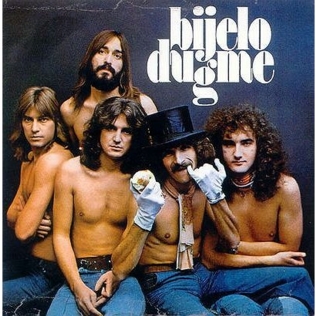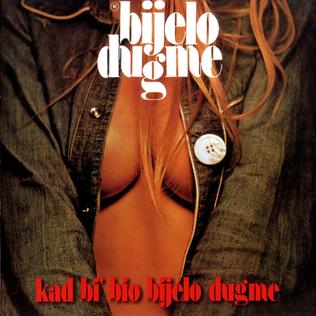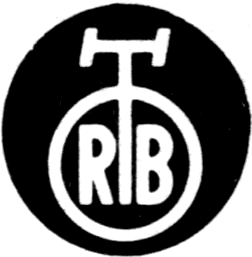Music of Serbia represents the musical heritage of Serbia, both historical and modern. It has a variety of traditional music styles, which are part of the wider Balkan musical tradition, with its own distinctive sound and characteristics.

Plavi Orkestar is a pop rock band originally formed in Sarajevo, SR Bosnia and Herzegovina, SFR Yugoslavia in 1982, and since 1998 based in Slovenia. Plavi Orkestar was one of the most popular acts of the 1980s Yugoslav rock scene and one of the best selling acts of the Yugoslav popular music scene in general.

Saša Lošić "Loša" is a Bosnian and Yugoslav singer, guitarist, songwriter, composer and music producer currently residing in Slovenia. He is best known as the frontman of the highly popular pop rock band Plavi Orkestar.

Jugoton was the largest record label and chain record store in the former Yugoslavia based in Zagreb, SR Croatia.
New wave in Yugoslavia was the new wave music scene of the Socialist Federal Republic of Yugoslavia. As its counterparts, the British and the American new wave, from which the main influences came, the Yugoslav scene was also closely related to punk rock, ska, reggae, 2 tone, power pop and mod revival. Some of its acts are also counted as belonging to the Yugoslav punk scene which already existed prior to new wave. Such artists were labeled as both punk rock and new wave.

Bijelo Dugme was a Yugoslav rock band, formed in Sarajevo, SR Bosnia and Herzegovina in 1974. Bijelo Dugme is widely considered to have been the most popular band ever to exist in the former Socialist Federal Republic of Yugoslavia and one of the most notable acts of the Yugoslav rock scene and Yugoslav popular music in general.

Kad bi' bio bijelo dugme is the 1974 debut studio album from influential Yugoslav rock band Bijelo Dugme.

PGP-RTB was a major state-owned record label and chain record store in the former SFR Yugoslavia, based in Belgrade, Socialist Republic of Serbia. After the breakup of Yugoslavia, in 1993, the company changed its name to PGP-RTS.
Popular music in Yugoslavia includes the pop and rock music of the former SFR Yugoslavia, including all their genres and subgenres. The scene included the constituent republics: SR Slovenia, SR Croatia, SR Bosnia and Herzegovina, SR Montenegro, SR Macedonia and SR Serbia and its subunits: SAP Vojvodina and SAP Kosovo. The pop and rock scene was a part of the general Music of Yugoslavia, which also included folk, classical music, jazz etc. Within Yugoslavia and internationally, the phrases ex-YU or ex-Yugoslav Pop and Rock both formally and informally generally to the SFRY period, though in some cases also to its successor the FR Yugoslavia including Serbia and Montenegro which existed until 2006.
Diskoton was a major record label in SFR Yugoslavia, based in Sarajevo, Socialist Republic of Bosnia and Herzegovina. The company ceased to exist in 1992, with the outbreak of the War in Bosnia and Herzegovina. The studio was destroyed along with all master recordings.

Jugodisk was a record label was established in 1968, in the then Socialist Republic of Serbia in SFR Yugoslavia in Belgrade, today Serbia. Before 1981, it was known as Beograd Disk. In 2003, the company was sold at a state auction to the show business manager Nenad Kapor and since then it operates as Jugodisk A.D..

Založba kaset in plošč RTV Ljubljana or Založba kaset in plošč Radiotelevizije Ljubljana, was a major record label in the former SFR Yugoslavia, based Ljubljana, Socialist Republic of Slovenia. In 1990, at the start of the breakup of Yugoslavia, the name of the company was changed to Založba kaset in plošč RTV Slovenija. It was and still remains a leading publishing firm in Slovenia.
Yugoslavia was represented at the Eurovision Song Contest 1991 with the song "Brazil" (Бразил), composed by Zoran Vračrvić, with lyrics by Dragana Šarić, and performed by Šarić herself under her stage name Bebi Dol. The Yugoslavian participating broadcaster, Jugoslavenska radiotelevizija (JRT), organized a national final, JRT izbor za pjesmu Evrovizije – Sarajevo '91, to select its entry for the contest. This was the penultimate entry from Yugoslavia in the Eurovision Song Contest.
Dubrovački trubaduri was a Croatian beat, folk and pop band from Dubrovnik formed in 1961 by Đelo Jusić, main composer, guitar and mandolin player and leader of the group. They were very popular in Yugoslavia during the 1960s and 1970s for their mixture of pop music and medieval folk traditions of their native ancient city on the Adriatic coast. Internationally also known as 'Dubrovnic Troubadours or The Troubadours Of Dubrovnik, they enjoyed brief popularity across Western Europe having appeared at the 1968 Eurovision Song Contest in London. Their song "Jedan dan" was performed by their singers Luciano "Lući" Capurso and Hamo Hajdarhodžić and it scored 7th position. Their other major hits include "Dok Palme Njišu Grane" from 1971, and the Italian-influenced "Noćna Muzika" from 1972. The group, in different line-ups, existed until the early 1980s when they broke up.

Denis & Denis was a Croatian and Yugoslav synth-pop group formed in Rijeka in 1982. They were one of the most prominent and most popular acts of the Yugoslav synth-pop scene.

Vatreni Poljubac is a hard rock and heavy metal band, originally formed in 1977 in Sarajevo, SR Bosnia and Herzegovina, SFR Yugoslavia, and since 1998 based in Belgrade, Serbia. Formed and led by vocalist, guitarist and songwriter Milić Vukašinović, Vatreni Poljubac was one the most notable acts of the Yugoslav hard rock and heavy metal scene.
Diskos was a Yugoslav state-owned record label, founded in 1962 and based in Aleksandrovac, SR Serbia.
Serbian pop is the pop music scene of Serbia. From the 1940s until the 1980s, while Serbia was a constituent republic of Socialist Federal Republic of Yugoslavia, Serbian pop scene was a part of the SFR Yugoslav pop scene.
Jugoslavijo, commonly known by its first verse Od Vardara pa do Triglava is a 1974 Yugoslav folk song written by a Belgrade lawyer and compositor Milutin Popović Zahar and composed and sung by Danilo Živković. The song celebrates the homeland of Yugoslavia, proudly referring to its greatest extents, its rivers, mountains, forests, polja and the sea, its proud people, as well as the fight, blood and workforce that created it.

New Partisans was a short-lived mid-1980s movement on the Yugoslav rock scene. The term was used to denote albums by Sarajevo-based bands Bijelo Dugme, Plavi Orkestar and Merlin which were characterized by pop rock and power pop sound with elements of folk music and lyrics and imagery heavily inspired by Yugoslav Partisans and Yugoslavism.











